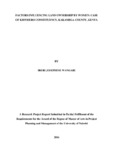case of missing toilets in Sardar Sarovar dam resettlements in Vadodara, Gujarat
Development projects bring tremendous changes in patterns of use of land, water, and other natural resources which leads to a range of resettlement effects. This process of economic and social dislocation most often exacerbates existing gender disparities and inequalities in affected areas. When gender differences are overlooked in project planning phase, projects are unlikely to respond to women’s need and may even have negative consequences.







